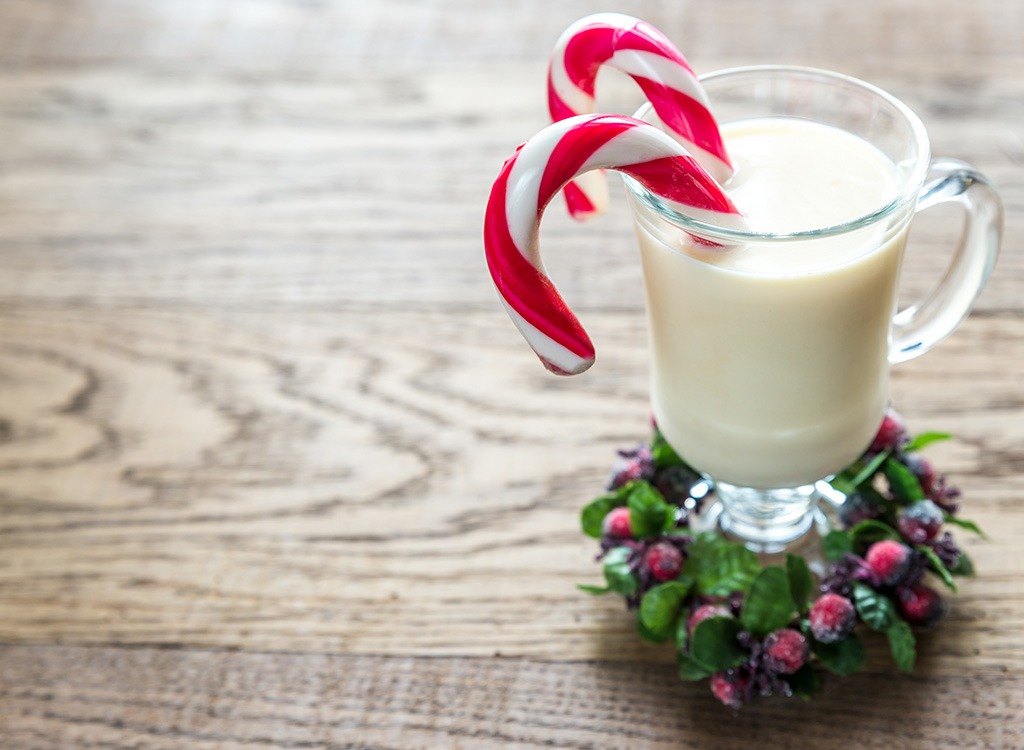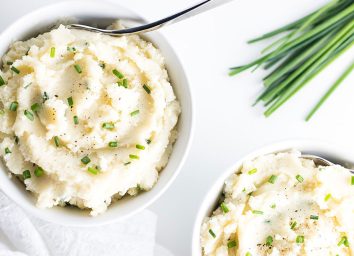How Bad for You Is Eggnog? We Asked Doctors to Find Out

Eggnog is a traditional and popular holiday staple—but how much fat and calories does it pack? And oh yeah—it has raw eggs in it, so is it even safe to drink? We looked into this much loved (and much maligned) Christmastime cocktail and asked some doctors to help determine whether you're taking your life in your hands when you grab a glass of the stuff. Here's what they had to say about how bad eggnog really is for you.
What's in eggnog?
First off, what exactly is in this centuries-old cocktail? At its most basic, eggnog is a blend of eggs, sugar, milk or cream (or milk and cream), and alcoholic liquor—usually rum or brandy. This unusual combo has its roots in a hot-milk-and-wine drink called posset, which was popular in England in the 15th century. But whereas that aristocratic libation used expensive sherry and no eggs, the recipe changed when the American colonists started to play with it. The milk stayed, but the alcohol switched to rum (which was cheaper to make and buy), and eggs were added because, well, dairy farms were a big thing in the colonies and eggs were easy to get. Scholars aren't entirely certain where the word eggnog comes from—it could be a contraction of "egg and grog" or a reference to a "noggin," which was a type of cup—but either way, the first recorded use of the word was in 1775, according to the etymologists at Merriam-Webster.
How bad is eggnog for you?
Short answer: pretty bad. "Eggnog carries a punch with high saturated fats and high sugar content," says Dr. Eudene Harry, MD, medical director for Oasis Wellness and Rejuvenation Center. "These are two of the things that we are most often counseled to limit in our diet, due to concerns about increased risk of chronic illness such as diabetes and heart disease." She adds that if you're reasonable and limit your holiday cheer to just "a few ounces once or twice during the holiday season, then the impact would be minimal." But that's not usually how holiday parties go, right?
What's the biggest health bomb in eggnog?
The fat and cholesterol contents are the problems here, says Dr. Melynda Barnes, Associate Clinical Director at Ro. "The heavy cream, eggs, and sugar contribute to store-bought eggnog having 350 calories and 149 mg of cholesterol. To put that in prospective, that's as much cholesterol as two double cheeseburgers, two fries, and two soft drinks." It's not surprising then that she says that eggnog is one of the bigger contributors to holiday weight gain. "The sugar can be bad for you as well, especially if you have diabetes, are pre-diabetic, or have a condition called insulin resistance," she adds. "Even if you do not have one of these conditions, excess sugar can also lead to weight gain."
What about the raw eggs?
"Raw eggs do carry the potential of salmonella infection, but the rates are really low," Dr. Barnes cautions. "Having said that, if you are pregnant or immunocompromised, you should not drink eggnog made with raw eggs." But as Dr. Harry adds, "Most of the eggs sold in stores are already pasteurized and treated, so that may offer some protection." She still recommends cooking eggs before making your own DIY nog: "Many recipes for eggnog do call for heating of the mixture slowly to a temperature of 160 degrees." And remember: The alcohol in eggnog does not kill salmonella. "The only way to eliminate the risk of getting salmonella food poisoning is to use pasteurized eggs or to heat up the eggnog on the stovetop for five to 10 minutes," says Dr. Barnes.
Are there any redeeming health qualities to eggnog?
"Of course, nothing is all bad," says Dr. Harry. "Eggnog could be fairly high in protein due to the eggs and the milk. Also, it would have a percentage of calcium daily requirements." Still, eggnog is not exactly healthy. "If you're looking for something to make you feel better about the drink, then I would point to the milk," says Dr. Barnes. "The milk has electrolytes and vitamins like vitamin D, calcium, vitamin A, phosphorus, and magnesium."
Homemade vs. store-bought
"There are pros and cons to both store-bought and homemade eggnog," Dr. Barnes explains. "Store-bought eggnog tends to have lower calories and fat because it is made with skim or low-fat milk, but it does have extra artificial ingredients like artificial coloring, high-fructose corn syrup, preservatives, and artificial flavors. Most homemade recipes call for heavy cream, which has many more calories and grams of saturated fat, but the ingredients are usually void of additives. If you can make a lower-calorie, lower-fat homemade eggnog, then that would be the healthiest option."
How can people make eggnog at least a little healthier?
"Consider skipping the heavy cream, substituting the whole milk with almond milk, and reducing or replacing the sugar with honey or maple syrup," Dr. Harry suggests. "If you are up for the challenge, you can skip the sugar completely and make up flavor with spices such as nutmeg, cinnamon, and clove." Dr. Barnes adds that you can also leave out the alcohol, and suggests a tip for those who prefer to just grab a carton from the store: "Look for all-natural or organic eggnog that is made without artificial flavors, colors, and ingredients," she says, "and one that is made with skim milk or a milk alternative such as sugar-free almond or coconut milk."








